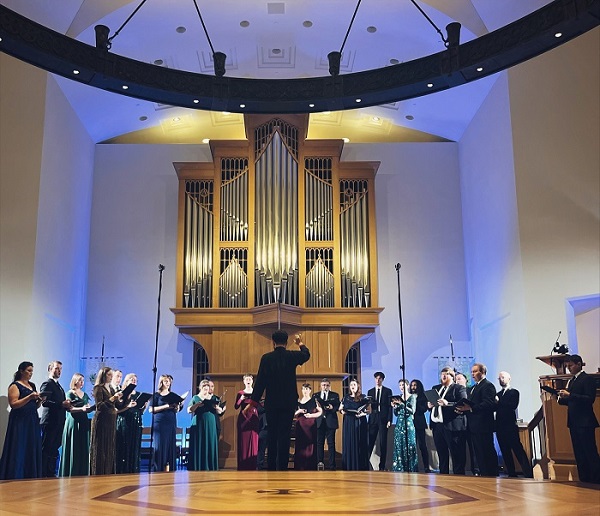The Thirteen and friends tackle Rachmaninoff’s weighty “Vespers”

Matthew Robertson conducted The Thirteen in Rachmaninoff’s All-Night Vigil Friday night at Virginia Theological Seminary’s Immanuel Chapel. Photo: Elizabeth Murray
The vocal ensemble The Thirteen presented Sergei Rachmaninoff’s All-Night Vigil Friday evening in a striking presentation of one of the composer’s signature works.
Often referred to as the “Vespers,” though it encompasses more than that church service alone, Rachmaninoff’s 1915 composition sits squarely in the tradition of pieces that utilize and adapt religious material yet are intended for the concert hall. Yet more than most works in the genre, it strives to actually create an atmosphere of devotional mystery. A “conscious counterfeit of the ritual,” in Rachmaninoff’s words, it invites a contemplation of liturgical practice as well as the ideas and stories drawn from those practices, feeling at home in a church in a way that a piece like the Missa Solemnis does not. For western audiences, the mix of familiarity and strangeness in the Orthodox tradition no doubt adds to this sense of ritual.
The Thirteen’s artistic director, Matthew Robertson, led an expanded group of 23 singers, setting the tone for the evening with a muscular sound in the opening “Priidite, poklonimsya” (Come, let us worship), aided by the generous acoustics of Virginia Theological Seminary’s Immanuel Chapel. While the Vigil is often tackled by much larger ensembles, the expert, highly responsive forces assembled here allowed Robertson to finely tune dynamics, from blistering climaxes to long, controlled descrendos employed in movements like the “Velikoye slavosloviye” (The great doxology).
Robertson also demonstrated an uncanny ability for finding a pulse that communicated momentum without feeling hurried, embroidering this sense of movement with suspended moments that emphasized a feeling of stasis and timelessness. If boisterous readings of movements like “Khvalite imya Gospodne” (Praise the name of the Lord) and the closing “Vzbrannoy voyevode” (To thee, victorious leader) resulted in some sacrifice of transparency and cohesion in the sound, these were exceptions.
The varied movements of the All-Night Vigil demand a wide palette of vocal coloring, which was vividly realized by the women’s voices. From ethereal background hues in “Blagoslovi, Dushe Moya” (Bless the Lord, O my soul), through different variations on a blended chorale sound, to fully present voices and robust communication of the text in “Slavoslovie Velikoye,” the singers did much to capture the different sound environments that Rachmaninoff created within the confines of his source material.
The men, joined here by the basso profundo voices of Glenn Miller and Eric Alatorre, thrillingly delivered the All-Night Vigil’s famous low passages, from moments like the closing of “Blagoslovi, dushe moya” to the rumbling bass line that undergirds “Khvalite imya Gospodne.” In a few places, however, the lower voices seemed to have trouble fully locking into the blend with the the rest of the chorus, including in some of the exposed moments for the section, such as the verses of the “Velichit dusha moya Gospoda” (My soul doth magnify the Lord).
Though the All-Night Vigil offers a rare opportunity for basses to outshine the tenor section, the tenors nonetheless distinguished themselves in moments like the opening passage of “Svete Tikhyi” (O gladsome light). Gene Stenger’s plangent sound made much of the role of celebrant and tenor soloist.
As a combined force, the choir offered many moments to appreciate across the evening, but for simply overwhelming, gorgeous unified sound, highlights included the beloved anthem “Bogoroditse Devo” (Rejoice, O virgin) and the two penultimate movements, “Dnes spaseniye” (Today salvation has come) and “Voskres iz groba” (Thou didst rise from the tomb).
This program will be repeated 7:30 p.m. March 4 and 5 p.m. March 5. thethirteenchoir.
